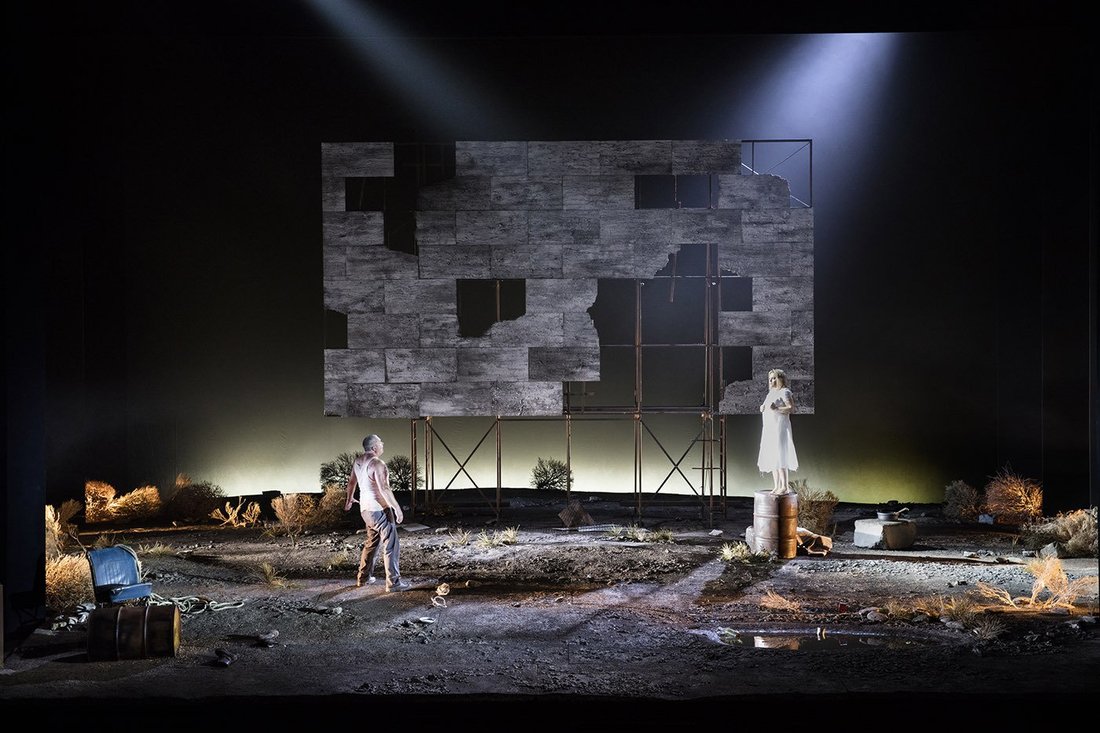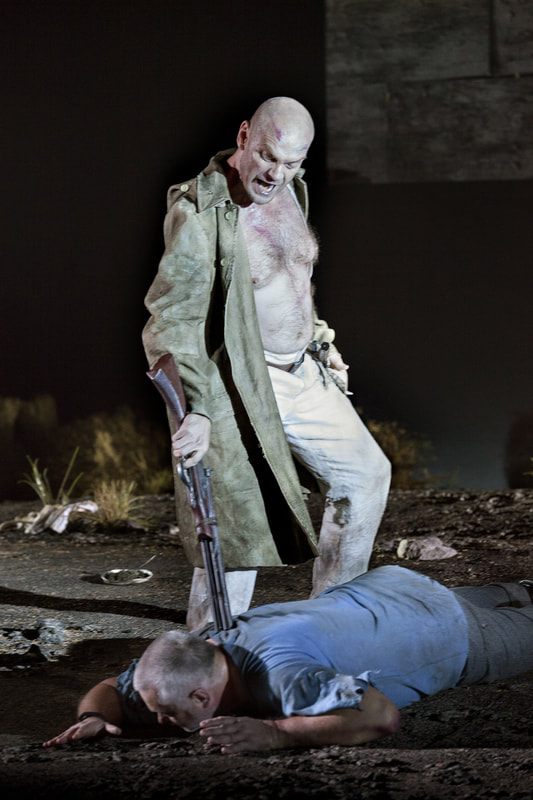Das Wunder der Heliane by Opera Vlaanderen: a grey, post-apocalyptic world with a soundtrack in Technicolor It is not spoiled with an very extensive backcatalogue of performances but this season - in the year of Korngold's 120th birthday, 60 years after his death - Das Wunder der Heliane is on the programme of two opera houses. In March 2018 it will perform at the Deutsche Opera in Berlin, until 10 October 2017 it will play with the Opera Vlaanderen. After almost half a century (after having received his first post-war production there in 1970), Das Wunder der Heliane is back in Ghent. The reason for this low rate of performances will, for one part, be due to the excessive demands of the piece (the opera needs a choir plus children's choir, keyboards including a piano, an organ, a celestial and a harmonium plus extensive sections of wind and brass). In the world of opera, people usually don't shy away from large gestures and the use of substantial resources, but the demands Korngold lay down on singers and musicians for his self-proclaimed masterpiece is even here considered exorbitant. For Das Wunder der Heliane, the word megalomaniac could be used, but this opera deserves better than the sour aftertaste that emerges from that expression. With full dedication the cast of Opera Vlaanderen responds to what Erich Wolfgang Korngold demands of them so unmercifully. For the singers, in their battle with the orchestra of Wagnerian size, it is an advantage that the pit in Ghent, a little bit like in Bayreuth, is for the most part under the stage. It saves them from pushing their voices too far in an attempt to overcome the massive orchestral sounds Korngold provided for his Wunder. The main roles are occupied by Ian Storey as The Stranger, Ausrine Stundyte as Heliane and Tómas Tómasson as The Ruler. Ian Storey is a tenor of Tristan caliber, who sings through his role with a smooth pace. Ausrine Stundyte attacks the title role with the energy of a young lioness. She does more than justice to the passion the words of The Stranger ignites in her. The young bass Markus Suihkonen makes a great impression as the gaoler and with Tómas Tómasson as The Ruler, this production got itself the voice of a hurricane. The Ruler of Tómasson is an aggressive and frustrated man. He lacks love and he knows it. He must settle for power. He bears in him the contradiction that makes Wotan such a tragic figure. It is not possible for both to combine power and love. For Wotan, there is a conscious choice – a choice for power that shows how powerless he really is. For the history of The Ruler we are left in the dark. It is, for example, unclear whether he can remember love from his earlier life, what path he has followed to bring him where he is now. The Ruler is being depicted as a gang leader and a drunk, a man who, despite his position at the top of the social order, has too often and for too long been on the selvedge. Together with designer Christof Hetzer, Director David Bösch provides Das Wunder der Heliane with a sober scenery; a grey, post-apocalyptic world with a soundtrack in Technicolor. Just like in his production of Die Gezeichneten by Franz Schreker for the Opéra de Lyon (in 2015), David Bösch chooses to materialize the moral wasteland of the main character(s) into scenery. A scenery that, by its static nature, almost automatically emphasizes the Personenregie. And just like Die Gezeichneten, which also was banned by the Nazis for being Entarted, in Heliane the gloomy background stands in stark contrast to the incredibly colourful music. In Tristan und Isolde we have to wait three and a half hours for salvation, for the final resolution of the Tristan-chord, that land mark in the history of music. (The blogpost "No Jazz without Tristan" is still under construction, I have to make a case for the hypothesis in the title, but the importance of Wagner's opera for the further development of music history can hardly be overestimated). Where the desire in Wagner's longing threatens to burn the skin, and seems forever be unattainable for satisfaction, Korngold's most ambitious opera skips, with saturated sounds, the longing and goes right for the bullseye; an Eargasm. The opera opens with the singing of Seraphim that bring an ode to love. It is the kick-off for almost three hours of the most benevolent composed music imaginable. Korngold's sense of melody reveals a fascination, by times obsession, with the music of Puccini. With his use of leitmotifs he points to Wagner, the other giant on whose shoulders he stands. It are the music dramas of the sorcerer from Bayreuth, together with the Viennese operettes of which he conducted many, and the late-Romantic compositions of the young Arnold Schönberg, that Korngold brings together in orchestral clusters of cotton candy with which he - and with Das Wunder der Heliane unfortunately in too few performances - still surprises with miraculous musical discoveries. Das Wunder would prove to be a blueprint for his own film music with which he would influence many others. Both Max Steiner (King Kong) and John Williams (Star Wars) are indebted to him. "Operas without words", Korngold used to call his film scores. These operas without words would seriously damage his status as a composer. They would, with retroactive effect, raise doubts about the artistic merits of Heliane (because it would sound too much like film music). Doubts that may have contributed to the fact that, after the Second World War, the opera did not make it into the repertoire. Where the desire in Wagner's Tristan threatens to burn the skin, Korngold's most ambitious opera skips, with saturated sounds, the longing and goes right for the bullseye; an Eargasm Das Wunder der Heliane as a blueprint for film music. There is more proto-film in this opera. The overture for the third act sounds like a break, reminiscent of the intermission music that was composed for many a blockbuster. (Watching a black screen with the word "Intermission" on it while music is playing for fifteen minutes - David Lean's Lawrence of Arabia in the DVD player - is one of my favorite “authentic” movie experiences. And yes, it comes with a serious nerd-alert.) Korngold's stay in Hollywood brought him two Oscars in the category for best film music (Anthony Adverse and The Adventures of Robin Hood) and saw him as an actor once. As Hans Richter, conductor during the premiere of Der Ring des Nibelungen in Bayreuth in 1876, he can be seen in a film about Richard Wagner "Magic Fire". After the angelic singing with which Das Wunder der Heliane opens, we see a man sitting, chained in front of the broken screen of an outdoor cinema, leftover from an old world, banned from the present world, because movies can serve as entertainment and that is strictly forbidden in this lunar landscape. “If I can’t have it, you can’t have it!” It’s this nihilistic reasoning with which The Ruler denies everyone what he himself misses most: love and happiness. In a desolated world, in which humans are stripped of what makes them human, only the right of the strongest remains. The one who is boss here shows himself not as a king with cloak and crown, but as a gangster with a sawed-off rifle barrel. His palace is an old railway wagon. A (self-)destructive world in which the message of happiness and love, spoken by someone coming from the outside, is the light in the darkness. A light that needs to be dimmed, it could only give people ideas. Ideas about freedom that would threaten the power of The Ruler. In a world in which everyone is denied the right to strive for happiness, men are reduced to zombies. The choir in the second act fits in with the scenes that make series such as The Walking Dead so widely popular. Here the hordes come to pick up The Stranger, their bearer of light, the one who has promised them a different, better world. “If I can’t have it, you can’t have it!” With this nihilistic reasoning The Ruler denies everyone what he himself misses most: love and happiness. The words of The Stranger ignites in Heliane the love that is in her fore a long time. Trapped in a loveless marriage, she reserves it for the one she considers worthy. The threats of her husband, The Ruler, who in vain demands her love, can’t change that. She shows herself naked to The Stranger. The production shows that nakedness in a white shirt. The seduction is depicted by a shoe that is pulled out, after which Heliane shows The Stranger her ankle. You're left with the idea that the sensuality, love and sexuality that resides in story and music, with this mise-and-en-scene and Personenregie (for the most part very direct and involved) do not completely get what they deserve.
The Ruler takes Heliane's rejections pretty bad. He reaches for the bottle and accuses her of adultery. In a seldomly seen act of both egotism and altruism, The Stranger takes his own life because he wants to leave for eternity with the love of Heliane on his mind and at the same time save Heliane, by dying, from the wrath of The Ruler. With his death, the only witness that can exonerate Heliane from the accusation of infidelity, is gone. Heliane, like the Empress in Die Frau Ohne Schatten and Tamino in Die Zauberflöte, is faced with an ordeal. She must bring The Stranger back from the dead. If she succeeds in doing so, she is innocent. In the process in which Heliane has to perform her miracle (by resurrecting The Stranger from the dead) she receives both veneration and condemnation of the people. It reminds us a little bit of Jesus who has to appear before Pilate. People who are disappointed with their (former) saviour want to see blood if the expected miracle does not occur. Heliane ultimately succeeds in her assignment to retrieve The Stranger from the dead, on which The Ruler, far beyond driven, kills her. The Stranger, just back from the dead, follows Heliane to the place where the two lovers no longer have to see the dawn of a new day. It is the place Tristan & Isolde, Romeo & Juliet were longing fore. A place free of Schoperhauerian snags: free from the impossibility to satisfy the lust two lovers generate together. Korngold had no realistic place in mind for the location of Das Wunder der Heliane. No clothing and stage props should nail into a certain time and place. The opera is not so much about dramatic development as well about breaking down the wall between the physical and mytical world. Eventually, the main characters succeed in doing so and one could say that death, by serving as a gateway to a world where the difference between mind and matter has disappeared, is supplying a happy-end. Korngold was not holding back on his ambitions and pretensions when making Das Wunder der Heliane. He would present himself in this self-proclaimed masterpiece as an advocate for excess while he, despite the time he takes, never seems to push the opera beyond its natural lenght. For this opera, which is not performed too much, one should not easily deny oneself a ticket to see it live. Next stop Berlin? Heliane: Ausrine Stundyte Der Herrscher: Tómas Tómasson Der Fremde: Ian Storey Der Pförtner: Markus Suihkonen Dirigent: Alexander Joel 15 - 23 September (Ghent) 1 - 10 Oktober (Antwerp)
0 Comments
Leave a Reply. |
TIMELINE
July 2024
|



 RSS Feed
RSS Feed